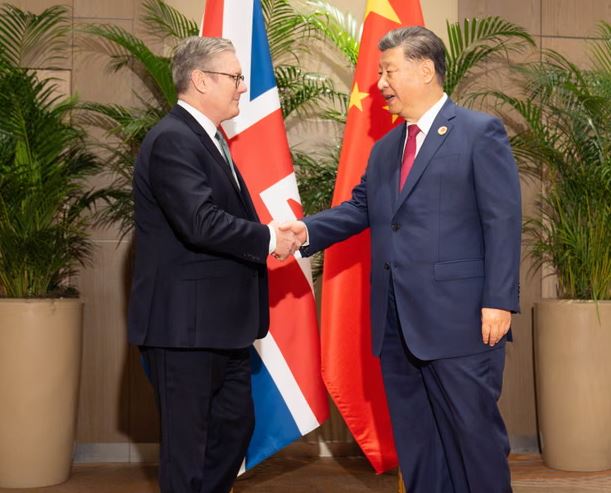Keir Starmer with Xi Jinping at the G20 summit in Rio de Janeiro, Brazil. Photograph: Stefan Rousseau/PA
Labour’s softened stance toward China raises concerns among Uyghur rights groups and activists, amid dropped espionage charges and human rights debates.
Turkistan Times, 11 October 2025 - The UK Labour government’s recent softening of its stance toward China has sparked renewed concern among human rights advocates and the Uyghur diaspora, after the Crown Prosecution Service dropped espionage charges against two men previously accused of spying for Beijing. While prosecutors cited insufficient evidence, the move has been widely interpreted as another sign that Prime Minister Keir Starmer’s administration seeks a less confrontational, more trade-oriented relationship with China.
According to The Guardian (October 10, 2025), senior Labour officials are seeking to “rebuild dialogue” with Beijing, focusing on investment and climate cooperation, while avoiding language that labels China a “systemic threat.” This marks a departure from previous rhetoric that highlighted human rights abuses in China, particularly the treatment of Uyghurs.
The Uyghur community and advocacy groups warn that economic pragmatism should not overshadow moral responsibility. The region remains the centre of international concern over mass detention, forced labour, and cultural repression of Uyghurs and other Turkic Muslim communities.

Members of the panel take their seats for the first day of hearings at the Uyghur Tribunal on June 4, 2021. Tolga Akmen/AFP/Getty Images
In 2021, the Uyghur Tribunal — an independent people’s court held in London and chaired by British barrister Sir Geoffrey Nice KC — concluded that the Chinese government had committed genocide and crimes against humanity against Uyghurs. Though not legally binding, its findings carried significant moral authority and were widely cited by international organisations and parliaments.
That same year, the U.S. Department of State formally declared China’s actions against Uyghurs as genocide. The UK Parliament, along with several others in Europe, passed motions acknowledging the same. These recognitions established strong precedents, which some fear could be undermined by Labour’s quieter diplomatic approach.
Within the UK Uyghur community, campaigners warn that softening criticism of Beijing risks eroding accountability. “Every time democratic governments retreat from naming genocide, it signals indifference,” said one activist based in London. Analysts suggest the Starmer government is attempting to balance human rights with economic realities, but critics caution that silence risks normalising repression.
Though the dropped spy case has no direct link to human rights, it symbolically underscores the perception of a cooling UK stance toward Beijing. Observers also suggest that this could complicate coordination with allies, such as the United States, on global human rights initiatives.
For supporters of Uyghur rights, moral consistency is key. As Labour seeks to redefine Britain’s relationship with China, the real test will be whether pragmatic engagement can coexist with a firm commitment to defending Uyghur rights worldwide.
Source: The Guardian, “Labour softening stance towards China reinforced by dropped spy case,” 10 October 2025.

